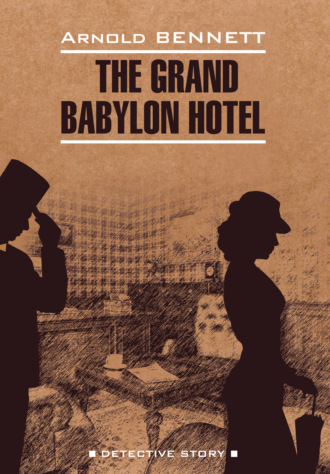
Полная версия
Отель «Гранд Вавилон» / The Grand Babylon hotel
It may seem incredible to the uninitiated that the guests at any social gathering held in so gorgeous and renowned an apartment as the Gold Room of the Grand Babylon should need the observation of a watchful eye. Yet so it was. Strange matters and unexpected faces had been descried from the little window, and more than one European detective had kept vigil there with the most eminently satisfactory results.
At eleven o’clock Theodore Racksole, afflicted by vexation of spirit, found himself gazing idly through the little barred window. Nella was with him.
Together they had been wandering about the corridors of the hotel, still strange to them both, and it was quite by accident that they had lighted upon the small room which had a surreptitious view of Mr and Mrs Sampson Levi’s ball. Except for the light of the chandelier of the ball-room the little cubicle was in darkness. Nella was looking through the window; her father stood behind.
‘I wonder which is Mrs Sampson Levi?’ Nella said, ‘and whether she matches her name. Wouldn’t you love to have a name like that, Father—something that people could take hold of—instead of Racksole?’
The sound of violins and a confused murmur of voices rose gently up to them.
‘Umph!’ said Theodore. ‘Curse those evening papers!’ he added, inconsequently but with sincerity.
‘Father, you’re very horrid to-night. What have the evening papers been doing?’
‘Well, my young madame, they’ve got me in for one, and you for another; and they’re manufacturing mysteries like fun. It’s young Dimmock’s death that has started ‘em.’
‘Well, Father, you surely didn’t expect to keep yourself out of the papers. Besides, as regards newspapers, you ought to be glad you aren’t in New York. Just fancy what the dear old Herald would have made out of a little transaction like yours of last night.’
‘That’s true,’ assented Racksole. ‘But it’ll be all over New York to-morrow morning, all the same. The worst of it is that Babylon has gone off to Switzerland.’
‘Why?’
‘Don’t know. Sudden fancy, I guess, for his native heath.’
‘What difference does it make to you?’
‘None. Only I feel sort of lonesome. I feel I want someone to lean up against in running this hotel.’
‘Father, if you have that feeling you must be getting ill.’
‘Yes,’ he sighed, ‘I admit it’s unusual with me. But perhaps you haven’t grasped the fact, Nella, that we’re in the middle of a rather queer business.’
‘You mean about poor Mr Dimmock?’
‘Partly Dimmock and partly other things. First of all, that Miss Spencer, or whatever her wretched name is, mysteriously disappears. Then there was the stone thrown into your bedroom. Then I caught that rascal Jules conspiring with Dimmock at three o’clock in the morning. Then your precious Prince Aribert arrives without any suite—which I believe is a most peculiar and wicked thing for a Prince to do—and moreover I find my daughter on very intimate terms with the said Prince. Then young Dimmock goes and dies, and there is to be an inquest; then Prince Eugen and his suite, who were expected here for dinner, fail to turn up at all—’
‘Prince Eugen has not come?’
‘He has not; and Uncle Aribert is in a deuce of a stew about him, and telegraphing all over Europe. Altogether, things are working up pretty lively.’
‘Do you really think, Dad, there was anything between Jules and poor Mr Dimmock?’
‘Think! I know! I tell you I saw that scamp give Dimmock a wink last night at dinner that might have meant—well!’
‘So you caught that wink, did you, Dad?’
‘Why, did you?’
‘Of course, Dad. I was going to tell you about it.’
The millionaire grunted.
‘Look here, Father,’ Nella whispered suddenly, and pointed to the balcony immediately below them. ‘Who’s that?’ She indicated a man with a bald patch on the back of his head, who was propping himself up against the railing of the balcony and gazing immovable into the ball-room.
‘Well, who is it?’
‘Isn’t it Jules?’
‘Gemini! By the beard of the prophet, it is!’
‘Perhaps Mr Jules is a guest of Mrs Sampson Levi.’
‘Guest or no guest, he goes out of this hotel, even if I have to throw him out myself.’
Theodore Racksole disappeared without another word, and Nella followed him.
But when the millionaire arrived on the balcony floor he could see nothing of Jules, neither there nor in the ball-room itself. Saying no word aloud, but quietly whispering wicked expletives, he searched everywhere in vain, and then, at last, by tortuous stairways and corridors returned to his original post of observation, that he might survey the place anew from the vantage ground. To his surprise he found a man in the dark little room, watching the scene of the ball as intently as he himself had been doing a few minutes before. Hearing footsteps, the man turned with a start.
It was Jules.
The two exchanged glances in the half light for a second.
‘Good evening, Mr Racksole,’ said Jules calmly. ‘I must apologize for being here.’
‘Force of habit, I suppose,’ said Theodore Racksole drily.
‘Just so, sir.’
‘I fancied I had forbidden you to re-enter this hotel?’
‘I thought your order applied only to my professional capacity. I am here to-night as the guest of Mr and Mrs Sampson Levi.’
‘In your new role of man-about-town, eh?’
‘Exactly.’
‘But I don’t allow men-about-town up here, my friend.’
‘For being up here I have already apologized.’
‘Then, having apologized, you had better depart; that is my disinterested advice to you.’
‘Good night, sir.’
‘And, I say, Mr Jules, if Mr and Mrs Sampson Levi, or any other Hebrews or Christians, should again invite you to my hotel you will oblige me by declining the invitation. You’ll find that will be the safest course for you.’
‘Good night, sir.’
Before midnight struck Theodore Racksole had ascertained that the invitation-list of Mr and Mrs Sampson Levi, though a somewhat lengthy one, contained no reference to any such person as Jules.
He sat up very late. To be precise, he sat up all night. He was a man who, by dint of training, could comfortably dispense with sleep when he felt so inclined, or when circumstances made such a course advisable. He walked to and fro in his room, and cogitated as few people beside Theodore Racksole could cogitate. At 6 a.m. he took a stroll round the business part of his premises, and watched the supplies come in from Covent Garden, from Smithfield, from Billingsgate, and from other strange places. He found the proceedings of the kitchen department quite interesting, and made mental notes of things that he would have altered, of men whose wages he would increase and men whose wages he would reduce. At 7 a.m. he happened to be standing near the luggage lift, and witnessed the descent of vast quantities of luggage, and its disappearance into a Carter Paterson van.
‘Whose luggage is that?’ he inquired peremptorily.
The luggage clerk, with an aggrieved expression, explained to him that it was the luggage of nobody in particular, that it belonged to various guests, and was bound for various destinations; that it was, in fact, ‘expressed’ luggage despatched in advance, and that a similar quantity of it left the hotel every morning about that hour.
Theodore Racksole walked away, and breakfasted upon one cup of tea and half a slice of toast.
At ten o’clock he was informed that the inspector of police desired to see him. The inspector had come, he said, to superintend the removal of the body of Reginald Dimmock to the mortuary adjoining the place of inquest, and a suitable vehicle waited at the back entrance of the hotel.
The inspector had also brought subpoenas for himself and Prince Aribert of Posen and the commissionaire to attend the inquest.
‘I thought Mr Dimmock’s remains were removed last night,’ said Racksole wearily.
‘No, sir. The fact is the van was engaged on another job.’
The inspector gave the least hint of a professional smile, and Racksole, disgusted, told him curtly to go and perform his duties.
In a few minutes a message came from the inspector requesting Mr Racksole to be good enough to come to him on the first floor. Racksole went. In the ante-room, where the body of Reginald Dimmock had originally been placed, were the inspector and Prince Aribert, and two policemen.
‘Well?’ said Racksole, after he and the Prince had exchanged bows. Then he saw a coffin laid across two chairs. ‘I see a coffin has been obtained,’ he remarked. ‘Quite right.’ He approached it. ‘It’s empty,’ he observed unthinkingly.
‘Just so,’ said the inspector. ‘The body of the deceased has disappeared. And his Serene Highness Prince Aribert informs me that though he has occupied a room immediately opposite, on the other side of the corridor, he can throw no light on the affair.’
‘Indeed, I cannot!’ said the Prince, and though he spoke with sufficient calmness and dignity, you could see that he was deeply pained, even distressed.
‘Well, I’m—’ murmured Racksole, and stopped.
Chapter Seven. Nella and the prince
IT appeared impossible to Theodore Racksole that so cumbrous an article as a corpse could be removed out of his hotel, with no trace, no hint, no clue as to the time or the manner of the performance of the deed. After the first feeling of surprise, Racksole grew coldly and severely angry. He had a mind to dismiss the entire staff of the hotel. He personally examined the night-watchman, the chambermaids and all other persons who by chance might or ought to know something of the affair; but without avail. The corpse of Reginald Dimmock had vanished utterly—disappeared like a fleshless spirit.
Of course there were the police. But Theodore Racksole held the police in sorry esteem. He acquainted them with the facts, answered their queries with a patient weariness, and expected nothing whatever from that quarter. He also had several interviews with Prince Aribert of Posen, but though the Prince was suavity itself and beyond doubt genuinely concerned about the fate of his dead attendant, yet it seemed to Racksole that he was keeping something back, that he hesitated to say all he knew. Racksole, with characteristic insight, decided that the death of Reginald Dimmock was only a minor event, which had occurred, as it were, on the fringe of some far more profound mystery. And, therefore, he decided to wait, with his eyes very wide open, until something else happened that would throw light on the business. At the moment he took only one measure—he arranged that the theft of Dimmock’s body should not appear in the newspapers. It is astonishing how well a secret can be kept, when the possessors of the secret are handled with the proper mixture of firmness and persuasion. Racksole managed this very neatly. It was a complicated job, and his success in it rather pleased him.
At the same time he was conscious of being temporarily worsted by an unknown group of schemers, in which he felt convinced that Jules was an important item. He could scarcely look Nella in the eyes. The girl had evidently expected him to unmask this conspiracy at once, with a single stroke of the millionaire’s magic wand. She was thoroughly accustomed, in the land of her birth, to seeing him achieve impossible feats. Over there he was a ‘boss’; men trembled before his name; when he wished a thing to happen—well, it happened; if he desired to know a thing, he just knew it. But here, in London, Theodore Racksole was not quite the same Theodore Racksole. He dominated New York; but London, for the most part, seemed not to take much interest in him; and there were certainly various persons in London who were capable of snapping their fingers at him—at Theodore Racksole. Neither he nor his daughter could get used to that fact.
As for Nella, she concerned herself for a little with the ordinary business of the bureau, and watched the incomings and outgoings of Prince Aribert with a kindly interest. She perceived, what her father had failed to perceive, that His Highness had assumed an attitude of reserve merely to hide the secret distraction and dismay which consumed him. She saw that the poor fellow had no settled plan in his head, and that he was troubled by something which, so far, he had confided to nobody. It came to her knowledge that each morning he walked to and fro on the Victoria Embankment, alone, and apparently with no object. On the third morning she decided that driving exercise on the Embankment would be good for her health, and thereupon ordered a carriage and issued forth, arrayed in a miraculous putty-coloured gown. Near Blackfriars Bridge she met the Prince, and the carriage was drawn up by the pavement.
‘Good morning, Prince,’ she greeted him. ‘Are you mistaking this for Hyde Park?’
He bowed and smiled.
‘I usually walk here in the mornings,’ he said.
‘You surprise me,’ she returned. ‘I thought I was the only person in London who preferred the Embankment, with this view of the river, to the dustiness of Hyde Park. I can’t imagine how it is that London will never take exercise anywhere except in that ridiculous Park. Now, if they had Central Park—’
‘I think the Embankment is the finest spot in all London,’ he said.
She leaned a little out of the landau, bringing her face nearer to his.
‘I do believe we are kindred spirits, you and I,’ she murmured; and then, ‘Au revoir, Prince!’
‘One moment, Miss Racksole.’ His quick tones had a note of entreaty.
‘I am in a hurry,’ she fibbed; ‘I am not merely taking exercise this morning. You have no idea how busy we are.’
‘Ah! then I will not trouble you. But I leave the Grand Babylon to-night.’
‘Do you?’ she said. ‘Then will your Highness do me the honour of lunching with me today in Father’s room? Father will be out—he is having a day in the City with some stockbroking persons.’
‘I shall be charmed,’ said the Prince, and his face showed that he meant it.
Nella drove off.
If the lunch was a success that result was due partly to Rocco, and partly to Nella. The Prince said little beyond what the ordinary rules of the conversational game demanded. His hostess talked much and talked well, but she failed to rouse her guest. When they had had coffee he took a rather formal leave of her.
‘Good-bye, Prince,’ she said, ‘but I thought—that is, no I didn’t. Good-bye.’
‘You thought I wished to discuss something with you. I did; but I have decided that I have no right to burden your mind with my affairs.’
‘But suppose—suppose I wish to be burdened?’
‘That is your good nature.’
‘Sit down,’ she said abruptly, ‘and tell me everything; mind, everything. I adore secrets.’
Almost before he knew it he was talking to her, rapidly, eagerly.
‘Why should I weary you with my confidences?’ he said. ‘I don’t know, I cannot tell; but I feel that I must. I feel that you will understand me better than anyone else in the world. And yet why should you understand me? Again, I don’t know. Miss Racksole, I will disclose to you the whole trouble in a word. Prince Eugen, the hereditary Grand Duke of Posen, has disappeared. Four days ago I was to have met him at Ostend. He had affairs in London. He wished me to come with him. I sent Dimmock on in front, and waited for Eugen. He did not arrive. I telegraphed back to Cologne, his last stopping-place, and I learned that he had left there in accordance with his programme; I learned also that he had passed through Brussels. It must have been between Brussels and the railway station at Ostend Quay that he disappeared. He was travelling with a single equerry, and the equerry, too, has vanished. I need not explain to you, Miss Racksole, that when a person of the importance of my nephew contrives to get lost one must proceed cautiously. One cannot advertise for him in the London Times. Such a disappearance must be kept secret. The people at Posen and at Berlin believe that Eugen is in London, here, at this hotel; or, rather, they did so believe. But this morning I received a cypher telegram from—from His Majesty the Emperor, a very peculiar telegram, asking when Eugen might be expected to return to Posen, and requesting that he should go first to Berlin. That telegram was addressed to myself. Now, if the Emperor thought that Eugen was here, why should he have caused the telegram to be addressed to me? I have hesitated for three days, but I can hesitate no longer. I must myself go to the Emperor and acquaint him with the facts.’
‘I suppose you’ve just got to keep straight with him?’ Nella was on the point of saying, but she checked herself and substituted, ‘The Emperor is your chief, is he not? “First among equals”, you call him.’
‘His Majesty is our over-lord,’ said Aribert quietly.
‘Why do you not take immediate steps to inquire as to the whereabouts of your Royal nephew?’ she asked simply. The affair seemed to her just then so plain and straightforward.
‘Because one of two things may have happened. Either Eugen may have been, in plain language, abducted, or he may have had his own reasons for changing his programme and keeping in the background—out of reach of telegraph and post and railways.’
‘What sort of reasons?’
‘Do not ask me. In the history of every family there are passages—’ He stopped.
‘And what was Prince Eugen’s object in coming to London?’
Aribert hesitated.
‘Money,’ he said at length. ‘As a family we are very poor—poorer than anyone in Berlin suspects.’
‘Prince Aribert,’ Nella said, ‘shall I tell you what I think?’ She leaned back in her chair, and looked at him out of half-closed eyes. His pale, thin, distinguished face held her gaze as if by some fascination. There could be no mistaking this man for anything else but a Prince.
‘If you will,’ he said.
‘Prince Eugen is the victim of a plot.’
‘You think so?’
‘I am perfectly convinced of it.’
‘But why? What can be the object of a plot against him?’
‘That is a point of which you should know more than me,’ she remarked drily.
‘Ah! Perhaps, perhaps,’ he said. ‘But, dear Miss Racksole, why are you so sure?’
‘There are several reasons, and they are connected with Mr Dimmock. Did you ever suspect, your Highness, that that poor young man was not entirely loyal to you?’
‘He was absolutely loyal,’ said the Prince, with all the earnestness of conviction.
‘A thousand pardons, but he was not.’
‘Miss Racksole, if any other than yourself made that assertion, I would—I would—’
‘Consign them to the deepest dungeon in Posen?’ she laughed, lightly.
‘Listen.’ And she told him of the incidents which had occurred in the night preceding his arrival in the hotel.
‘Do you mean, Miss Racksole, that there was an understanding between poor Dimmock and this fellow Jules?’
‘There was an understanding.’
‘Impossible!’
‘Your Highness, the man who wishes to probe a mystery to its root never uses the word “impossible”. But I will say this for young Mr Dimmock. I think he repented, and I think that it was because he repented that he—er—died so suddenly, and that his body was spirited away.’
‘Why has no one told me these things before?’ Aribert exclaimed.
‘Princes seldom hear the truth,’ she said.
He was astonished at her coolness, her firmness of assertion, her air of complete acquaintance with the world.
‘Miss Racksole,’ he said, ‘if you will permit me to say it, I have never in my life met a woman like you. May I rely on your sympathy—your support?’
Конец ознакомительного фрагмента.
Текст предоставлен ООО «ЛитРес».
Прочитайте эту книгу целиком, купив полную легальную версию на ЛитРес.
Безопасно оплатить книгу можно банковской картой Visa, MasterCard, Maestro, со счета мобильного телефона, с платежного терминала, в салоне МТС или Связной, через PayPal, WebMoney, Яндекс.Деньги, QIWI Кошелек, бонусными картами или другим удобным Вам способом.







